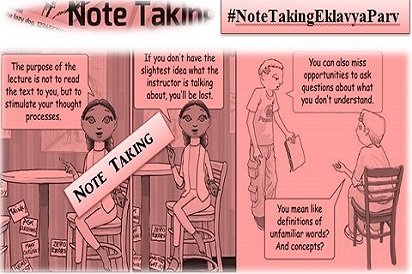Academic Survival is the objective of a student, as well as, a faculty or an educational administrator. It needs to be acknowledged that ‘If we keep notes-we are kept in notes’. EklavyaParv When we conceptualize the Concept of Note Taking, there comes a significant challenge. We encounter it from the side of the one whom we listen to or read.
Yes, a major challenge in taking notes is the variation in lecturing/teaching styles of lecturers or instructors.
Some have the virtue of being well organised; some are ‘storytellers’ who leave it to the patience of the students to determine the significance and conclusion.
Some of them wander at random levels of explanations. It is important to understand and determine the communication style of the speaker. A close eye on the methodology of the lecture will help in unveiling important ideas. This will guide us in determining what information should be included in notes taken during a lecture.
“Effective note-taking takes practice, and even the very best students may lose track in a discussion or become confused about the objectives in a lesson. Don't become discouraged. Remember that the more you think about the lecture—i.e., listen actively and take good notes—the more you will understand. It is what you actually do with the ideas presented in class—or those generated in your thoughts through listening, reading and thinking—that are critical to your understanding and retaining the material.”
Through a comprehensive (EklavyaParv) observation, a few categories of ‘Note Takers’ can be discussed as under:
- The Difficult Note Takers: (Hard Nuts to Crack) ‘Few Phrases Writers’ who take the ‘Minimalist’ approach and note down the highlighted points only. They fall for the Figures and Facts; the rest is left to the ‘normal learners’.
- Half Cooked Category Note Takers: They take Partial Notes and are termed as the Selective Note Takers as the content is at their mercy when they decide to make notes for a certain part of the work.
- The Saint Category Note Takers: They take everything as gospel truth and jot down everything and anything. We see such attentive attendants everywhere and sometimes wonder about the Heard-Processed without Observation-Noted mechanism. There is nothing wrong, but it remains a shabby scheme in this age of smartness.
- The Super-Self Note Takers: Reflection Based Notes come in this category. It is the ‘creative afterthought’ they give to review and enhance their notes. It is possible that the notes are hardly based on the prescribed text or the lecture. The Reflective Note Takers whose notes are only ‘slackly’ based on the text, very often deviate widely into the realm of their own thoughts. Such intellectually productive reactions to the text/lecture are good, but the big idea from the text itself must be captured.
- The Concerned Note-Taker- YOU: Let’s derive a blend of all the above categories with all the goodness adopted and removing all the unfitting requisites. ‘You Category Note Taker’ makes it a rule to get a prior update on the topic to be lectured upon. Rather than piling on the desk, ‘You’ keeps sufficient tools, sits at a suitable place and manages to take note of the following:
Note It Down if the Lecturer/Instructor:
- Repeats a term or definition
- Writes a word or phrase on the board
- Highlights it with underlining or a different colour
- Points or Gestures towards the mentioned content
- Changes in Tone or pitch of the voice
- Especially mentions a text or reference book
- Places questions to the audience to test Previous Knowledge
- Gives an example
- Slows down to shift to another aspect or to attract attention
- Uses introductory terms/phrases to precede an important idea in the lecture
Have a Look at the Following Suggestions by Stanford University Experts:



